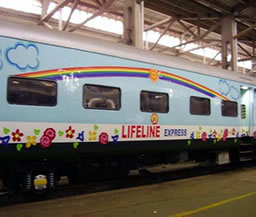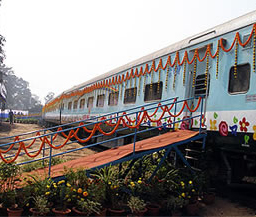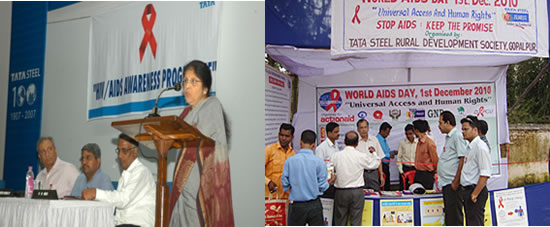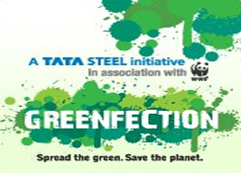Tata Steel Corporate Citizenship
By - Onkar Vaidya
Background of the Company
The Tata Steel Group has always believed that mutual benefit of countries, corporations and communities is the most effective route to growth. Tata Steel has not limited its operations and businesses within India but has built an imposing presence around the globe as well. With the acquisition of Corus in 2007 leading to commencement of Tata Steel's European operations, the Company today is the tenth largest steel producer in the world with employee strength of above 81,000 across five continents. The Company has always had significant impact on the economic development in India and now seeks to strengthen its position of pre-eminence in international domain by continuing to lead by example of responsibility and trust. Tata Steel's overseas ventures and investments in global companies have helped the Company create a manufacturing and marketing network in Europe, South East Asia and the Pacific-rim countries.
History and Company's definition of CSR
Tata Steel, for the last 100 years has been committed to the social upliftment and development of the state of Jharkhand. It has been working towards improving the quality of life of the communities it operates in. Social development and welfare of communities of Jharkhand has been internalized by the Company since its inception and has been followed since then, making Tata Steel a leader in the area of social commitment..The wealth generated by Jamsetji Tata and his sons in half a century of industrial pioneering formed but a minute fraction of the amount by which they enriched the nation. The whole of that wealth is held in trust for the people and used exclusively for their benefit. The cycle is thus complete: what came from the people has gone back to the people many times over. For Jamsetji Tata, the progress of enterprise, welfare of people and the health of the enterprise were inextricably linked. Wealth and the generation of wealth have never "been ends in themselves, but a means to an end, for the increased prosperity of India," The Times of India said in 1912 of the Tatas. Successive generations of Tata Group leaders have always held the belief that no success in material terms is worthwhile unless it serves the interest of the nation and is achieved by fair and honest means.
Conscious that the task of social progress, especially in a country as diverse as India, cannot be undertaken by the Government alone, J R D Tata the Chairman of the Tata Group from 1938 to 1991, believed that, "to create good working conditions, to pay the best wages to its employees and provide decent housing to its employees are not enough for the industry, the aim of an industry should be to discharge its overall social responsibilities to the community and the society at large, where industry is located." Guided by this mandate, Tata Steel has for decades used its skills and resources, to the extent it can reasonably afford, to give back to the community a fair share of the product of its efforts. It was the first to establish labour welfare practices, even before these were made statutory laws across the world. In 1912 it invited Sidney and Beatrice Webb, the Founders of the London School of Economics, to prepare a Memorandum of Health for the Steel City. The Company also instituted an eight-hour workday in 1912, free medical aid in 1915, a Welfare Department in 1917, leave with pay, Workers Provident Fund and Workmen's Compensation in 1920 and Maternity Benefit for ladies in 1928. With the understanding that the hunger for employment can never be satisfied despite its best efforts, the Company took an enlightened decision to address the needs of those who migrated to its vicinity in search for employment. It first stimulated entrepreneurship and economic development in the Steel City and then reached out to the rural poor, empowering them with the means to create better livelihoods within their own villages. At the same time, Tata Steel also fulfilled their basic need for health care, food security, education and income generation through the development of rural infrastructure, empowerment and community outreach programmes.
CSR Policy
Tata Steel's Corporate Social Responsibility Policy is rooted in the belief that the primary purpose of a business is to improve the quality of life of the people. It takes into account every single person in its sphere of development and ensures that its socio-economic initiatives touch the lives of all stakeholders in a positive way. Therefore, in and around the operational areas of Tata Steel, whether it is a functioning facility or a project in the implementation stage, the emphasis is on all-round growth. This encompasses initiatives in income generation, education, healthcare, water, electricity and all other basic services. The Tata Steel CSR policy encompasses initiatives to conserve, sustain and renew the environment, to encourage sustainable socio-economic development of the community and to improve the quality of life of the people living in the areas in which it operates. In all their programmes, the organisations seek to engage the ultimate beneficiaries of an initiative right from the conceptualisation and planning stage to the implementation, with the company playing the role of a catalyst eliciting positive change. The attempt is to get the people to act out of their own convictions, and support them in their efforts to build a better future.
CSR Initiatives
 'Lifeline Express in not one of the regular trains which are run for normal passengers. Jeevan Rekha Express is another name which is used by people for this train. This train is governed by the Impact India Foundation. This train is a running hospital in the simplest words. The Health Ministry of India and the Indian Railways joined their hands for introducing this train. However, the funds for introducing this train were given by Impact UK.
'Lifeline Express in not one of the regular trains which are run for normal passengers. Jeevan Rekha Express is another name which is used by people for this train. This train is governed by the Impact India Foundation. This train is a running hospital in the simplest words. The Health Ministry of India and the Indian Railways joined their hands for introducing this train. However, the funds for introducing this train were given by Impact UK.
16 July, 1991 is the date when this train was flagged off for the first time. This train is serving a large number of poor regions of the country. Over so many years, this train has benefited around 4 Lakh people. In the last sixteen years, this train has completed around ninety three projects for the health welfare of those people who are struggling for their good health in the remotest regions of India. At present, 2 trains are operated under the Lifeline Express. Other countries like China and Bangladesh have taken a lesson from this Train and introduced similar trains.
The mission of this train is to reach the disabled people who do not have access to medical facilities in the rural areas of India. On the spot advanced medical diagnosis and surgical treatments are offered to the people who need them. Apart from this, the Lifeline Express also tries to encourage the local people to help the people in need. It tries to make the people aware. For this, it seeks the support of local authorities present in the villages of India. In a way, this train is also educating people to help themselves in the remotest parts of India.
It is a truth that even today there are a lot of villages in India which do not have adequate medical facilities. Many villages do not have a single hospital. This train is doing a very great work for the poor people of the rural areas of India. A large number of medical services like Orthopedic/ surgical treatment for restoration of movement of parts in handicapped people, surgery for correcting the cleft palate etc.are offered by this train.
 Extending better healthcare facilities to the people living in the rural and inaccessible remote areas, TATA Steel hosted the Lifeline Express, the world's first hospital on wheels for the sixth time in Odisha at the Jajpur Road railway station from December 14th 2010 to January 15th 2011. The Lifeline Express is a joint collaboration between the Impact India Foundation, the Rajiv Gandhi Foundation and the Indian Railways. People living in the farthest corner of Jajpur district, parts of Bhadrak and Kendrapara districts benefited from this initiative. Prior to this, TATA Steel has already hosted the train in five locations of Odisha Gopalpur, Bamanipal, Jajpur Road, Meramundali and Joda. The Lifeline Express is equipped with a modern operation theatre, which offers diagnostic, medical and surgical treatment for prevention and curative interventions for the handicapped. Through the initiative, polio and orthopedic defects of people would be treated through surgery and provision of calipers; eye testing and restoration of eyesight through cataract operations and providing intra ocular lenses would be done; restoration of hearing through surgery and supply of hearing aids, correction of clefts through surgery, counseling and referral services and arrangements for follow up of the patient's progress with local authorities would be made. TATA Steel is the only corporate house in the country to sponsor the Lifeline Express for the highest number of times across the States of Bihar, Jharkhand, Odisha, West Bengal, and Chhattisgarh. Till date, through this train, TATA Steel has reached out to more than 67,800 persons offering medical treatment. The company's entire range of healthcare services has been reaching out annually to 400,000 people in the interior villages of Odisha through five hospitals and mobile health clinics.
Extending better healthcare facilities to the people living in the rural and inaccessible remote areas, TATA Steel hosted the Lifeline Express, the world's first hospital on wheels for the sixth time in Odisha at the Jajpur Road railway station from December 14th 2010 to January 15th 2011. The Lifeline Express is a joint collaboration between the Impact India Foundation, the Rajiv Gandhi Foundation and the Indian Railways. People living in the farthest corner of Jajpur district, parts of Bhadrak and Kendrapara districts benefited from this initiative. Prior to this, TATA Steel has already hosted the train in five locations of Odisha Gopalpur, Bamanipal, Jajpur Road, Meramundali and Joda. The Lifeline Express is equipped with a modern operation theatre, which offers diagnostic, medical and surgical treatment for prevention and curative interventions for the handicapped. Through the initiative, polio and orthopedic defects of people would be treated through surgery and provision of calipers; eye testing and restoration of eyesight through cataract operations and providing intra ocular lenses would be done; restoration of hearing through surgery and supply of hearing aids, correction of clefts through surgery, counseling and referral services and arrangements for follow up of the patient's progress with local authorities would be made. TATA Steel is the only corporate house in the country to sponsor the Lifeline Express for the highest number of times across the States of Bihar, Jharkhand, Odisha, West Bengal, and Chhattisgarh. Till date, through this train, TATA Steel has reached out to more than 67,800 persons offering medical treatment. The company's entire range of healthcare services has been reaching out annually to 400,000 people in the interior villages of Odisha through five hospitals and mobile health clinics.
Aids Awareness Programs

On the occasion of World AIDS Day, TATA Steel Ltd flagged off an initiative of Awareness on Aids campaign. It is a two day campaign to cover a host of prominent colleges and locations all across Kolkata. This included St Xavier's College, Presidency College, Bethune College, Calcutta University, Jadavpur University, Kolkata Airport, City Centre, Forum to name a few. The awareness programs, involved children and community members to be the agents of mass awareness for preventing the spread of deadly HIV/AIDS virus. Various programs were undertaken across Tata Steel's operational areas of Kalinganagar (Orissa), Lohandiguda (Chhattisgarh), and West Bokaro(Jharkhand),Sukinda (Orissa). The activities include hosting rallies, nukkad nataks, quizzes, distributing pamphlets, condoms, blood donation camps, stage show , signature campaigns etc.
In addition, acknowledging the importance of contributions made by trucker's community, the TATA Steel Rural Development Society in collaboration with Transport Corporation of India Foundation Jharkhand State Aids Control Society and National Aids Control Society organized a nationwide Trucker's Utsav. Project Kavach which is an endeavor to arrest the spread of AIDS amongst the truckers community was part of this Utsav at Jamshedpur's Transportnagar. It is an informal infotainment event, which acts as catalyst for communicating behavior change messages to sizable groups in a fun, peer supportive context.In Jharia, TSRDS collaborated with Mother Teresa High School, Jorapokor to organize a rally of senior students .More than 1,000 people gathered for the cause at the TATA Steel Gopalpur unit at Orissa The program included Signature Campaign Stalls, Folk shows on HIV/AIDS and High School rally.
TATA Steel is always recognized for contributing towards the global effort in fighting against HIV/AIDS and it is one of the first corporate houses to have separate HIV/AIDS workplace policy and has bagged many national & international awards in this field. The programs undertaken by TATA Steel on the World AIDS Day are addition to the various activities undertaken by TATA Steel. Since early 1990's TATA Steel has been instrumental in spreading awareness and address the concerns of HIV/AIDS, by reaching across to every corner of the country though various programs. On an ongoing basis TATA Steel has been running Targeted Intervention projects, establishing Community Care Centre for People Living with HIV/AIDS and promoting HIV testing through Integrated Counseling & Testing Centre were few of the ongoing initiatives of TATA Steel Rural Development Society.
Greenfection
 Greenfection" is the resolve to "infect" the whole of India with the will to change towards a greener future. Tata Steel has tied up with the World Wildlife Federation, Star News, MTV, National Geographic and Radio Mirchi 98.3 FM to work on several programmes under this initiative. The Company is using social media and blog sites to attract participation from young people and films on the environment will also be screened. The "Plant a Sapling" and "Click a Sapling" programmes have been launched.
Greenfection" is the resolve to "infect" the whole of India with the will to change towards a greener future. Tata Steel has tied up with the World Wildlife Federation, Star News, MTV, National Geographic and Radio Mirchi 98.3 FM to work on several programmes under this initiative. The Company is using social media and blog sites to attract participation from young people and films on the environment will also be screened. The "Plant a Sapling" and "Click a Sapling" programmes have been launched.
Today, the environment is on the brink of irreversible damage. Before the impact becomes critical, we have to act. A world without biodiversity has a very bleak future. Millions of people and millions of species all share the same planet, and only together can we enjoy a safer and more prosperous future.
Taking a cue from this, Tata Steel has been investing in environmental sustainability and has played a vital role in boosting the biodiversity of the areas where it operates. Let us reconnect with nature and put in efforts to earn a reputation as a green pioneer and develop a new vision for biodiversity.
Tata Steel aspires to be the global steel industry benchmark in Value Creation and Corporate Citizenship. Its commitment towards environmental issues associated with steel production processes is reflected in its Vision 2012 statement. One of the goals of the company is to reduce CO2 emissions to less than 1.7 tonnes per liquid tonne of steel (t/tls) by 2012.
 On this World Environment Day on June 5, Tata Steel has launched the GREENFECTION campaign. Tata Steel believes that actions by a group of people or organizations won't be enough. It needs to spread exponentially, like something infectious. GREENFECTION is the consciousness and resolve to impact the environment in a positive way. That is what the company wants to spread, from person to person, from cities to villages and vice versa, till the whole nation is infected with the will to make a change, to create a greener, happier future.
On this World Environment Day on June 5, Tata Steel has launched the GREENFECTION campaign. Tata Steel believes that actions by a group of people or organizations won't be enough. It needs to spread exponentially, like something infectious. GREENFECTION is the consciousness and resolve to impact the environment in a positive way. That is what the company wants to spread, from person to person, from cities to villages and vice versa, till the whole nation is infected with the will to make a change, to create a greener, happier future.
Tata Steel has tied up with WWF (World Wildlife Federation) - to reach out to the school children through the nature clubs in schools across 10 cities in India and conduct a tree planting campaign.
Budget
Prizes and Recognitions
- Recognition from World Steel Association to Tata Steel for demonstrating excellence in safety and health programmes in 2009.
- The Xiamen Safe Work Place Enterprise Award to NatSteel.
- National Safety Awards to the West Bokaro and Jharia divisions, and Sukinda Chromite mines.
- The CSR Leadership Award 2009 to Tata Steel at the Orissa State Safety Awards.
- The Excellence in Manufacture Award to Siam Construction Steel Company for Quality, Environment and Safety Management from the Department of Primary Industries and Mines,Ministry of Industry.
